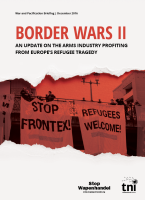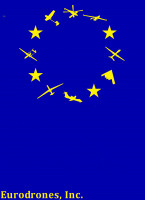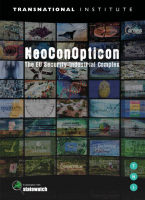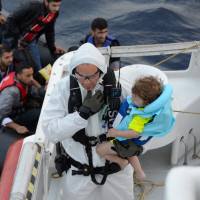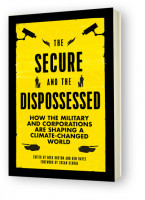Border Wars The arms dealers profiting from Europe's refugee tragedy
Topics
While tens of thousands of refugees have died fleeing terrible violence and hardship to get to Europe, not everyone has lost out. This report exposes the military and security companies that have profited from the tragedy, winning contracts to provide the equipment to border guards, the surveillance technology to monitor frontiers, and the IT infrastructure to track population movements.
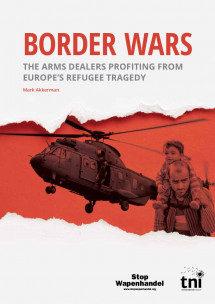
Downloads
-
Border Wars (PDF, 6.06 MB)Average time to read: 90 min minutes
-
Border Wars - Executive Summary (PDF, 171.28 KB)Average time to read: 5 min minutes
Authors
Please note: This report was followed up with a briefing update in December 2016 - Border Wars II
Executive Summary
The refugee crisis facing Europe has caused consternation in the corridors of power, and heated debate on Europe’s streets. It has exposed fundamental faultlines in the whole European project, as governments fail to agree on even limited sharing of refugees and instead blame each other. Far-right parties have surged in popularity exploiting austerity-impacted communities in putting the blame for economic recession on a convenient scapegoat as opposed to the powerful banking sector. This has been most potently seen in the UK, where leaders of the ‘Leave EU’ campaign unscrupulously amplified fears of mass migration to successfully mobilise support for Brexit. Refugees fleeing terrible violence and hardship have been caught in the crossfire; forced to take ever more dangerous routes to get to Europe and facing racist attacks in host nations when they finally arrive.
However there is one group of interests that have only benefited from the refugee crisis, and in particular from the European Union’s investment in ‘securing’ its borders. They are the military and security companies that provide the equipment to border guards, the surveillance technology to monitor frontiers, and the IT infrastructure to track population movements.
This report turns a spotlight on those border security profiteers, examining who they are and the services they provide, how they both influence and benefit from European policies and what funding they receive from taxpayers. The report shows that far from being passive beneficiaries of EU largesse, these corporations are actively encouraging a growing securitisation of Europe’s borders, and willing to provide ever more draconian technologies to do this.
Most perverse of all, it shows that some of the beneficiaries of border security contracts are some of the biggest arms sellers to the Middle-East and North-African region, fuelling the conflicts that are the cause of many of the refugees. In other words, the companies creating the crisis are then profiting from it.
Moreover they have been abetted by European states who have granted the licences to export arms and have then granted them border security contracts to deal with the consequences. Their actions are also in the framework of an increasingly militarised response to the refugee crisis by the European Union.
Under the banner of ‘fighting illegal immigration’, the European Commission plans to transform its border security agency Frontex into a more powerful European Border and Coast Guard Agency. This would have control over member states border security efforts and a more active role as a border guard itself, including purchasing its own equipment. The agency is backed up by EUROSUR, an EU system connecting member and third states’ border security surveillance and monitoring systems.
Militarisation of border security is also demonstrated by the military objectives of the ‘European Union Naval Force – Mediterranean Operation Sophia’ (EUNAVFOR MED) as well as the use of military on many borders, including Hungary, Croatia, Macedonia and Slovenia. NATO naval missions in the Mediterranean are already actively assisting EU border security.
Meanwhile, countries outside the EU are being pushed to take up a role as outpost border guards to try to stop refugees from reaching the EU borders. The recent EU migration deals with Turkey, which have been severely criticised by human rights organisations, deny refugees access to Europe and have resulted in more violence against them.
The report shows that:
- The border security market is booming. Estimated at some 15 billion euros in 2015, it is predicted to rise to over 29 billion euros annually in 2022
- The arms business, in particular sales to the Middle-East and North-Africa, where most of the refugees are fleeing from, is also booming. Global arms exports to the Middle-East actually increased by 61 per cent between 2006–10 and 2011–15. Between 2005 and 2014, EU member states granted arms exports licences to the Middle East and North Africa worth over 82 billion euros
- The European policy response to refugees which has focused on targeting traffickers and strengthening its external borders (including in countries outside the European Union) has led to big budget increases which benefits industry
- Total EU funding for member state border security measures through its main funding programmes is 4.5 billion euros between 2004 and 2020
- Frontex, its main border control agency’s budget increased 3,688% between 2005 and 2016 (from €6.3m to €238.7m)
- EU new member states have been required to strengthen borders as a condition of membership, creating additional markets for profit. Equipment purchased or upgraded with External Borders Fund money includes 54 border surveillance systems, 22,347 items of operating equipment for border surveillance and 212,881 items of operating equipment for border checks
- Some of the arms sales permits to the Middle-East and North Africa are also intended for border control. In 2015, for example the Dutch government granted a 34 million euro export license to Thales Nederland for the delivery of radar and C3-systems to Egypt despite reports of human right violations in the country
- The European border security industry is dominated by major arms companies, who have all set up or expanded security divisions as well as a number of smaller IT and specialist security firms. Italian arms giant Finmeccanica identified “border control and security systems” as one of the primary drivers for increase in orders and revenues
- The big players in Europe’s border security complex include arms companies Airbus, Finmeccanica, Thales and Safran, as well as technology giant Indra. Finmeccanica and Airbus have been particularly prominent winners of EU contracts aimed at strengthening borders. Airbus is also the number one winner of EU security research funding contracts
- Finmecannica, Thales and Airbus, prominent players in the EU security business are also three of the top four European arms traders, all active selling to countries in the Middle East and North Africa. Their total revenues in 2015 amounted to 95 billion euros
- Israeli companies are the only non-European receivers of research funding (thanks to a 1996 agreement between Israel and the EU) and also have played a role in fortifying the borders of Bulgaria and Hungary, and promote their expertise based on the West Bank separation wall and the Gaza border with Egypt. Israeli firm BTec Electronic Security Systems, selected by Frontex to participate in its April 2014 workshop on ‘Border Surveillance Sensors and Platforms’, boasted in its application mail that its “technologies, solutions and products are installed on [the] Israeli-Palestinian border”
- The arms and security industry helps shape European border security policy through lobbying, through its regular interactions with EU’s border institutions and through its shaping of research policy. The European Organisation for Security (EOS), which includes Thales, Finmecannica and Airbus has been most active in lobbying for increased border security. Many of its proposals, such as its push to set up a cross European border security agency have eventually ended up as policy – see for example the transformation of Frontex into the European Border and Coastguard Agency (EBCG). Moreover Frontex/EBCG’s biannual industry days and its participation in special security roundtables and specialist arms and security fairs ensure regular communication and a natural affinity for cooperation.
- The arms and security industry has successfully captured the 316 million euros funding provided for research in security issues, setting the agenda for research, carrying it out, and then often benefiting from the subsequent contracts that result. Since 2002, the EU has funded 56 projects in the field of border security and border control.
Collectively the evidence shows a growing convergence of interests between Europe’s political leaders seeking to militarise the borders and its major defence and security contractors who provide the services. But this is not just an issue of conflicts of interest or of profiteering from crisis, it is also about the direction Europe takes at this critical moment. More than a half century ago, then US President Eisenhower warned of the dangers of a military-industrial complex, whose power could “endanger our liberties or democratic processes”. Today we have an even more powerful military-security-industrial complex, using technologies that point outwards and inwards, that right now are targeted at some of the most vulnerable desperate people on our planet.
Allowing this complex to escape unexamined poses a threat to democracy and to a Europe built on an ideal of cooperation and peace. As Eisenhower put it: “Down the long lane of the history yet to be written... this world of ours, ever growing smaller, must avoid becoming a community of dreadful fear and hate, and be instead, a proud confederation of mutual trust and respect.”

